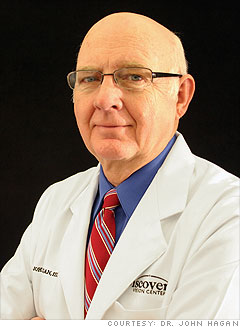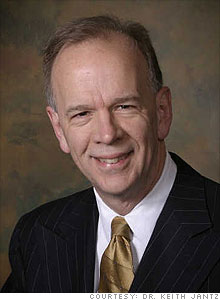Seniors squeezed as doctors shun Medicare
If a proposed 21% cut in payment rates goes through in 2010, it could spark a physician boycott against new enrollees.
 |
| Dr. John Hagan said he's "scared to death" about retiring, becoming Medicare-dependent, and not being able to get access to his doctors. |
 |
| Dr. Keith Jantz, an internist with Kansas City Internal Medicine, warns that what's happening at his group could be a harbinger of a nationwide trend of doctors turning away Medicare patients. |
NEW YORK (CNNMoney.com) -- Medicare has become a scary word to the doctors at the largest private group practice in Kansas City, Mo.
It's so scary that most physicians at Kansas City Internal Medicine, with 65% of its nearly 70,000 active patients age 65 or older, have stopped accepting walk-in Medicare enrollees, said Dr. David Wilt, an internist at the group.
Wilt and his colleagues say they are shunning the area's growing senior population because they believe Medicare doesn't reimburse physicians enough to cover the cost of care.
"And if Medicare further cuts its reimbursement rates, then we'll be functioning at a loss," said Wilt.
Wilt -- and doctors with lots of senior patients -- are especially troubled by a 21% cut in Medicare payments to physicians scheduled to take place in 2010. Last week, the Senate voted against stopping that cut, and more annual cuts over the next decade, from taking place.
"If the [21%] cut happens, that cut in our payments will exceed our profits. The only option to us to stay in business will be to fire employees," Wilt said.
Physicians say a boycott against Medicare has already begun because they are tired of dealing with the yearly threat of a payment cut.
Dr. John Hagan, a Kansas City-area ophthalmologist, offers a unique perspective. "I can speak to both sides of this," he said.
As many as 75% of patients at his group practice are Medicare beneficiaries who are treated for problems such as glaucoma or undergo cataract surgery. And if payment rates are cut 21%, after already being reduced to about half the going $1,200 rate for cataract surgery and care in Missouri, Hagan said he won't be able to see more Medicare patients because he won't be able to cover his expenses.
But Hagan himself became Medicare-eligible this month -- and he's nervous. "If I accept Medicare for myself and my wife, I'm fearful I won't be able to stay with my cardiologist and my wife won't be able to stay with her physicians," he said.
Hagan has elected not to enroll in Medicare. Instead, he's paying extra out of pocket for his company's insurance coverage.
"At some point I won't want to work," said Hagan. "At that time, I will be on Medicare, and I am scared to death."
The federal government's Center for Medicare and Medicaid Services (CMS) said it is aware of anecdotal reports of doctors not taking Medicare beneficiaries.
However, the agency maintains that its own data, and other industry reports, show only a small percentage of beneficiaries unable to get physician access.
CMS said 96.5% of all practicing physicians, nearly 600,000 doctors, currently participate in Medicare.
"Geographically, the level within every state is less than 5% of Medicare beneficiaries who have difficulties accessing a doctor," said Renee Mentnech, director of CMS' Research and Evaluation Group.
Mentnech also pointed to an August report from the Government Accountability Office (GAO), an independent branch of the Congress, that showed less than 3% of Medicare beneficiaries reported major difficulties accessing physician services in 2007 and 2008.
But these numbers do little to comfort seniors such as Earl Bean, 67. He recently told CNNMoney.com that he couldn't easily find a new primary care physician who accepted Medicare after his former doctor retired and Bean himself had to move to a new city.
"I had a company supplemental policy with drug coverage. It didn't matter," said Bean. "They wanted nothing to do with me."
Dr. Mark Laitos, a family physician based in Longmont, Colo., said Medicare-dependent seniors in his area are still able to find primary care physicians "but it takes some effort."
"They have to make a bunch of phone calls, get on waiting lists or go over to the next town," said Laitos.
He stopped seeing new Medicare seniors six years ago because of reimbursement issues. Laitos said Medicare on average reimburses him 80 cents on the dollar. "If I charge a patient under 65 one dollar for a service, for a Medicare patient I can only charge 80 cents," he said.
"As patients in my practice are getting older, the day they become Medicare-eligible, my reimbursement drops," he said.
Still, he's not ditching his long-standing patients who've aged into Medicare. "If I ran the practice like a business, I would," Laitos said. "This is a small town. It's hard to drop all Medicare patients."
"Doctors face this bizarre dance every year. Most are frustrated and resent this threat to cut our rates when our costs are increasing every year," he said.
Federal law requires that Medicare physicians' payment rates be adjusted annually based on a sustainable-growth rate that's tied to the health of the economy.
Physicians face a rate cut every year, although Congress has at the last minute blocked those cuts from happening in seven of the last 8 years.
Dr. Keith Jantz, an internist at Kansas City Internal Medicine, fears that if the 21% cut goes through next year, "physicians around the country would stop seeing any Medicare patients."
"It's happening in places like Las Vegas and in Anchorage, Alaska, and this could be a harbinger of what's to come unless Medicare maintains decent [payment] rates," Jantz said.
The AARP, the nation's largest senior-citizen advocacy group, not only wants the Senate to rescind this year's cut, it wants long-term action. "Short-term patches to preserve physician pay make the access problem [for seniors] worse by undermining doctors' confidence in the Medicare program," the group said in a statement
The American Medical Association (AMA), which represents doctors, is pushing for a permanent repeal of the reimbursement formula.
"We believe that as part of comprehensive health reform, physicians have to be incented to keep people healthy and out of the hospital," said James Rohack, president of the AMA. "Under this formula, they are penalized for doing it." ![]()


